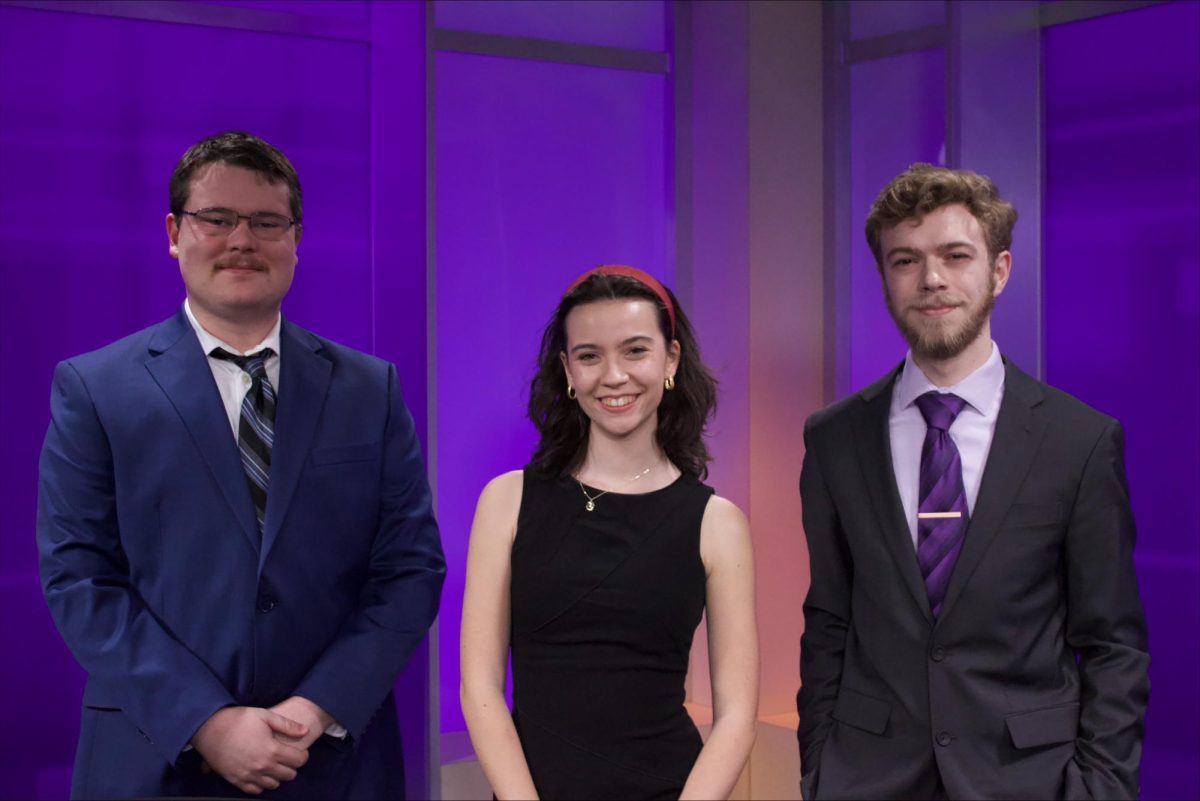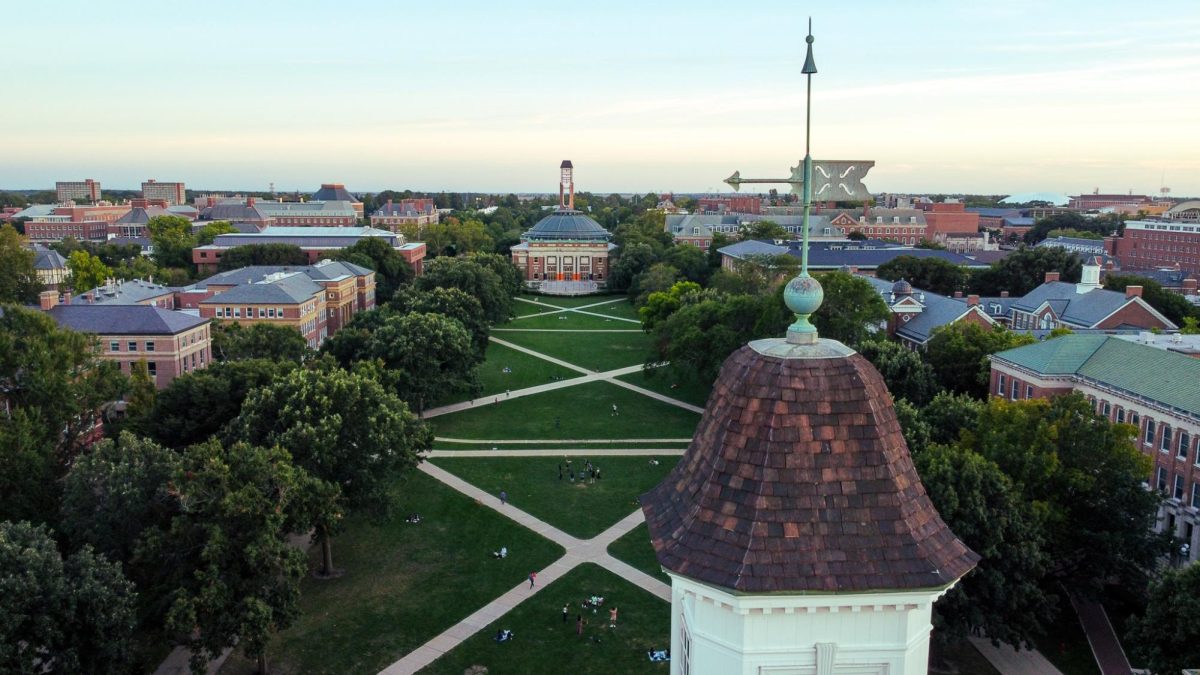Last updated on Feb. 23, 2025 at 02:18 p.m.
Illinois Student Council presidential candidates Patrick Holt, Gabi DalSanto and Alex Belanger gathered Thursday evening to discuss University policies, debate ISC funding and share their hopes for their presidency.
UI7, the University’s cable news channel, hosted and produced the debate at the Richmond Studio in Urbana. The debate was moderated by Mary Piacente and Kaitlyn Devitt, both of whom have separately worked for The Daily Illini. All candidates were invited by UI7 to participate in the debate.
Holt, sophomore in ACES, is a member of the University Senate and has served on committees for admissions, educational policy and honorary degrees. Holt and his running mate Nina O’Dea, sophomore in LAS, have campaigned on protecting student expression rights and academic freedom.
DalSanto, sophomore in ACES, and her running mate Anjali Kumar, sophomore in LAS, are running on a platform of sustainability, student wellness and student rights. DalSanto is an action co-coordinator for the Students for Environmental Concerns. Kumar has served on the ISC as a senator and chairperson and is a member of the Illini Democrats.
Get The Daily Illini in your inbox!
Belanger, sophomore in LAS, is a former ISC senator and current deputy speaker. His running mate, Carter Blount, sophomore in AHS, has served on the ISC as a senator and chairperson. The pair are campaigning on decreasing general education requirements and adopting a mascot for Illinois athletics.
University investment in fossil fuel companies was one of the most prominent talking points throughout the evening. All three candidates strongly opposed the University’s investment practices and supported divestment initiatives.
DalSanto took part in a recent effort to place a referendum on the student ballot asking whether students support University divestment from fossil fuel companies. As president, DalSanto said she would work with the next chancellor to ensure it was a priority.
“Our University is not shut out to the idea of divestment; the issue is they don’t currently believe that students care about it,” DalSanto said, stating the presidency would allow her to “take the temperature” on how students feel about divestment.
Holt said that, given the immense student support for divestment, a central part of his presidency would be holding the University accountable for its “unethical investments” in fossil fuels.
Belanger argued that for the divestment push to succeed, the University needs to be more transparent with its financial interactions.
In a notable moment, Piacente challenged Belanger and DalSanto over reports that the pair privately discussed giving Belanger a position as chief of staff in DalSanto’s administration should she win.
This would negate ISC election conventions because while executive positions — like the chief of staff — are appointed, they require an open and formal application process. Both Belanger and DalSanto confirmed they met but denied making any formal promises to one another.
“We talked about potential scenarios for a lot of different people, including myself, and including how (DalSanto and Kumar) would fit into an administration that I was in charge of,” Belanger said. “That’s simply it … there was absolutely nothing in question about that meeting.”
Moderators also asked the candidates how they plan to support undocumented students and deferred action for childhood arrivals amid waves of deportation nationwide by the Trump administration. DalSanto said she was raised by an immigrant, and she has felt fear for people who may be facing removal from the country. She proposed providing additional resources to undocumented students and their families.
Belanger cited the HOPE Scholarship, a fund created by ISC in 2020, that supports students who are undocumented, have temporary protection status or are DACA recipients. He said the ISC Congress plans to vote to include a referendum on the student ballot proposing an increase in the fee.
“Every single person on this campus needs support, and we need to be doing whatever we can to support them,” Belanger said.
Holt was asked by the moderators how he plans to ensure minority students on campus feel supported. He strongly backed the committee on diversity, equity and inclusion. He said that “cuts coming from the University, especially directed at the cultural houses” were “frankly pretty appalling.”
However, Holt was mistaken. Danita M. Brown Young, vice chancellor for student affairs, refuted the rumor that circulated on social media last week.
In another key moment later in the night, candidates were asked how they plan to reform the ISC budget. The ISC budget is currently $80,000 yearly, with the majority allocated to “ISC member experiences,” while funds intended for events and advocacy often remain unspent.
Piacente asked candidates to raise their hands if they would forgo the $10,000 stipend that ISC presidents and vice presidents receive to support more student programs. Holt raised his hand and said he “thinks” he would forfeit the stipend, while Belanger and DalSanto did not.
The debate concluded with statements by the candidates. In his statement, Belanger said students should trust him and his running mate to be effective leaders of the student body. Dalsanto said if students voted for her, her administration would listen to every perspective and effectively represent students’ interests in talks with the administration. Holt said regardless of the election’s outcome, he plans to continue to advocate for his campaign platforms through his senate position.
Students can vote in the ISC elections between Tuesday and Thursday next week. To watch the full UI7 debate livestream, click here.








